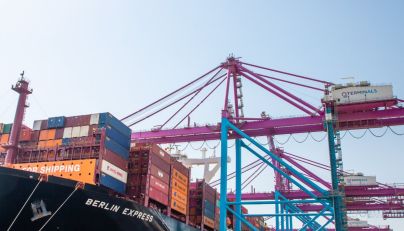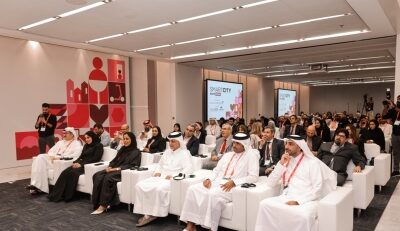Business
Qatar’s Ports Enhance Global Trade Network with Modern Infrastructure

Qatar’s ports are significantly enhancing the nation’s role in global trade, serving as essential maritime gateways for the movement of goods and commodities. Under the supervision of the Ministry of Transport, these ports have undergone extensive strategic development, positioning them among the most advanced port networks in the region.
The integration of modern infrastructure with the country’s free zones and logistics capabilities has transformed these ports into effective links between markets in Asia, the Middle East, Africa, Europe, and the Americas. This development has notably reduced cargo transit times and improved overall supply chain efficiency.
Hamad Port: A Key Player in Maritime Trade
Hamad Port stands as Qatar’s primary gateway for international commerce, officially inaugurated by H H Sheikh Tamim bin Hamad Al-Thani in September 2017. It has quickly gained recognition as one of the largest and most modern ports in the Gulf and Middle East.
Once all phases of development are complete, Hamad Port is expected to handle more than 7.5 million TEUs annually and will manage over 95 percent of the country’s maritime imports. This makes it a vital hub for the import and export of diverse goods. The port features a sophisticated infrastructure, including a general and bulk cargo terminal with an annual capacity of 7 million tons, and a multi-purpose terminal designed to accommodate up to 500,000 vehicles annually.
Commitment to Sustainability and Economic Growth
In an interview with Qatar News Agency, Captain Abdulaziz Nasser Al Yafei, Executive Vice President of Operations at Mwani Qatar, emphasized the environmental initiatives being implemented at Hamad Port. These include the adoption of eco-friendly technologies and sustainability projects, such as the resettlement of hundreds of thousands of mangrove trees. These initiatives aim to protect marine life, preserve ecosystems, and reduce carbon emissions, thereby aligning with global sustainable economic practices.
Captain Al Yafei highlighted that Hamad Port plays a crucial role in driving economic activity related to maritime trade. Its impact extends beyond local market needs, stimulating a variety of economic sectors, particularly in industry, warehousing, and logistics services. The port adheres to the highest environmental and developmental standards, ensuring its operations contribute positively to Qatar’s economy.
As Qatar continues to develop its ports and improve its infrastructure, the country is poised to strengthen its position on the global trade map, facilitating enhanced connectivity and economic growth.
-

 World2 weeks ago
World2 weeks agoPrivate Funeral Held for Dean Field and His Three Children
-

 Top Stories2 weeks ago
Top Stories2 weeks agoFuneral Planned for Field Siblings After Tragic House Fire
-

 Sports3 months ago
Sports3 months agoNetball New Zealand Stands Down Dame Noeline Taurua for Series
-

 Entertainment3 months ago
Entertainment3 months agoTributes Pour In for Lachlan Rofe, Reality Star, Dead at 47
-

 Entertainment2 months ago
Entertainment2 months agoNew ‘Maverick’ Chaser Joins Beat the Chasers Season Finale
-

 Sports3 months ago
Sports3 months agoSilver Ferns Legend Laura Langman Criticizes Team’s Attitude
-

 Sports1 month ago
Sports1 month agoEli Katoa Rushed to Hospital After Sideline Incident During Match
-

 World3 weeks ago
World3 weeks agoInvestigation Underway in Tragic Sanson House Fire Involving Family
-

 Politics2 months ago
Politics2 months agoNetball NZ Calls for Respect Amid Dame Taurua’s Standoff
-

 Top Stories2 weeks ago
Top Stories2 weeks agoShock and Grief Follow Tragic Family Deaths in New Zealand
-

 Entertainment3 months ago
Entertainment3 months agoKhloe Kardashian Embraces Innovative Stem Cell Therapy in Mexico
-

 World4 months ago
World4 months agoPolice Arrest Multiple Individuals During Funeral for Zain Taikato-Fox





















